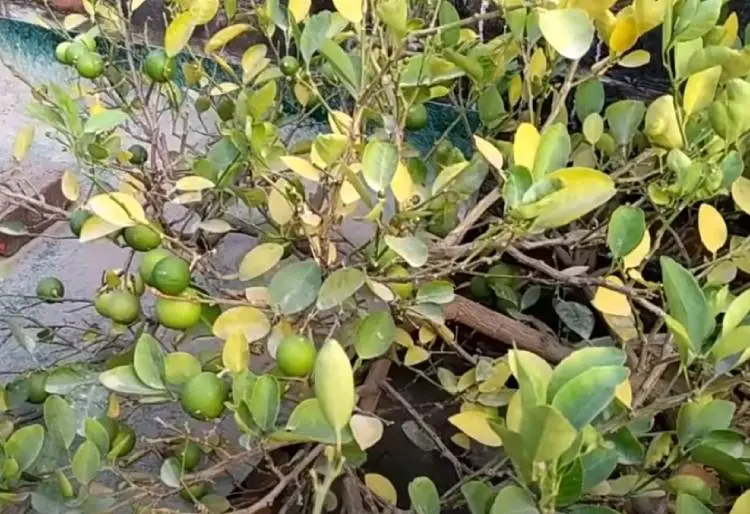It’s a warm summer evening, and you’re strolling through your lemon grove, basking in the sweet fragrance of citrus blossoms. You smile at the sight of your baby lemons starting to grow on the trees, proud of the fruits of your labor. But suddenly, you notice something’s not quite right. The baby lemons are turning yellow and falling off! As a lemon enthusiast, it’s natural to feel alarmed and wonder what’s happening to your precious citrus babies.
Fear not! In this article, we’ll embark on a journey to uncover the reasons behind this lemon conundrum and help you understand what you can do to prevent it. Let’s get started!
The Case of the Yellowing Baby Lemons
First, let’s address the question that has undoubtedly been nagging at you: Why are your tiny lemons turning yellow? The yellowing of baby lemons is a symptom of a broader issue, and there are several factors that could be at play. These include nutrient deficiencies, pests, diseases, and environmental factors.
- Nutrient Deficiencies
Lemons, like all plants, require certain nutrients to grow and develop properly. When they lack these essential elements, it can lead to discolored fruit, poor growth, and even fruit drop. The most common culprits include nitrogen, phosphorus, potassium, magnesium, and calcium deficiencies. To remedy this, use a balanced citrus fertilizer and ensure your soil pH is within the optimal range for lemon trees (between 6.0 and 7.0).
- Pests and Diseases
Another reason for baby lemons turning yellow and falling off could be pests or diseases attacking your tree. Some common pests that attack lemon trees include citrus leaf miners, aphids, scale insects, and mealybugs. These pests can cause damage to leaves, stems, and fruit, leading to yellowing and fruit drop.
Diseases such as citrus greening, also known as Huanglongbing (HLB), can cause severe damage to your lemon tree, including fruit drop and yellowing. This disease is spread by the Asian citrus psyllid, a small insect that feeds on citrus leaves. Unfortunately, there is no cure for HLB, so prevention and early detection are crucial. Monitor your trees for signs of infestation and consult with an expert if you suspect a problem.
- Environmental Factors
Environmental factors, such as temperature, humidity, and water availability, can also affect the health of your lemon tree. Sudden temperature changes or extreme heat can cause fruit drop, as can drought or overwatering. To prevent this, make sure your tree is well-watered, but avoid overwatering, which can lead to root rot. Also, provide shade or protection from direct sunlight during extremely hot weather.
The Dark Side: Baby Lemons Turning Brown and Falling Off
Now that we’ve explored the reasons behind baby lemons turning yellow, let’s delve into another perplexing phenomenon: baby lemons turning brown and falling off. This issue is usually a result of a fungal disease called anthracnose. The fungus affects the fruit’s surface, causing it to develop brown, sunken lesions that eventually lead to the fruit dropping off the tree. To prevent anthracnose, maintain proper tree hygiene by removing fallen leaves and fruit and applying a fungicide according to label instructions.
The Falling Leaves Mystery
Lemon leaves falling off can be a sign of various problems, including nutrient deficiencies, pest infestations, diseases, and environmental stress. By addressing the issues mentioned above, you can help keep your lemon tree’s leaves healthy and intact.
Decoding Baby Lemon Drop
Baby lemons dropping off the tree, also known as fruit drop, can be a frustrating issue for any lemon tree owner. As we’ve seen, there are several factors that can cause baby lemons to fall prematurely. By identifying and addressing these issues, you can help reduce fruit drop and ensure a healthy harvest.
Small Lemons: Size Does Matter
At this point, you may be wondering what causes small lemons in the first place. While some fruit drop is normal, especially during the initial stages of fruit development, there are certain factors that can lead to smaller lemons. These include:
- Insufficient pollination
Poor pollination can lead to underdeveloped, small fruit. To promote better pollination, encourage bees and other pollinators to visit your lemon tree by planting flowers nearby.
- Overcrowding
Too many fruits on a branch can compete for nutrients and result in smaller lemons. To avoid overcrowding, thin out the fruits early in the season, allowing the remaining lemons to grow larger.
- Environmental stress
As mentioned earlier, factors like temperature, water, and sunlight can impact the size of your lemons. Provide your tree with the right conditions to promote healthy growth.
Caring for Your Lemon Tree: Tips for Success
Now that we’ve explored the reasons behind baby lemons turning yellow and falling off, let’s discuss some general tips to ensure the health and well-being of your lemon tree. By following these guidelines, you can minimize the chances of encountering problems and enjoy a thriving lemon tree year after year.
- Pruning and Training
Pruning your lemon tree is essential for promoting healthy growth, ensuring proper air circulation, and maintaining an aesthetically pleasing shape. Remove dead, damaged, or diseased branches, as well as branches that cross or rub against each other. Additionally, prune your tree to maintain an open canopy, which allows sunlight to penetrate and air to circulate.
Training your lemon tree to grow in the desired shape is also crucial. Use stakes and ties to guide young branches and create a strong, well-balanced structure.
- Mulching and Weed Control
Mulching your lemon tree can help conserve soil moisture, regulate soil temperature, and suppress weed growth. Use organic mulch, such as wood chips, shredded bark, or compost, and spread it in a 2-4 inch layer around the base of the tree. Avoid piling mulch against the trunk, as this can cause rot and invite pests.
Weed control is also essential for maintaining a healthy lemon tree. Weeds compete with your tree for nutrients, water, and sunlight, so keep the area around your tree weed-free.
- Regular Monitoring
Regularly inspect your lemon tree for signs of nutrient deficiencies, pests, diseases, and environmental stress. Early detection and intervention are key to preventing problems from escalating and causing significant damage to your tree.
Know Your Lemon Tree Varieties
Lemon trees come in various varieties, each with its unique characteristics and growth habits. Some popular varieties include ‘Eureka,’ ‘Lisbon,’ ‘Improved Meyer,’ and ‘Ponderosa.’ Understanding the specific needs of your lemon tree variety can help you provide the best possible care and ensure a healthy, productive tree.
In summary, caring for your lemon tree requires attention, patience, and knowledge of its specific needs. By following the tips outlined in this article and addressing any issues that arise, you can enjoy a flourishing lemon tree that produces abundant, delicious fruit. So, go ahead and nurture your lemon tree with confidence, knowing that you are well-equipped to tackle any challenges that come your way. With a little effort and dedication, you’ll be rewarded with the satisfaction of picking sun-kissed lemons from your very own tree.
Frequently Asked Questions (FAQs)
Baby lemons turning yellow can be a result of nutrient deficiencies, pests, diseases, or environmental factors. Addressing these issues can help prevent yellowing and ensure a healthy harvest.
Small lemons turning yellow and falling off can be due to various factors, including nutrient deficiencies, pests, diseases, and environmental stress. By identifying and addressing these issues, you can prevent fruit drop and promote a healthy harvest.
Baby lemons turning brown and falling off are usually a sign of anthracnose, a fungal disease. To prevent this, maintain proper tree hygiene by removing fallen leaves and fruit and applying a fungicide according to label instructions.
Lemon leaves falling off can be a sign of nutrient deficiencies, pest infestations, diseases, or environmental stress. Addressing these issues can help keep your lemon tree’s leaves healthy and intact.
Baby lemons dropping off the tree can be caused by various factors, such as nutrient deficiencies, pests, diseases, and environmental stress. Identifying and addressing these issues can help reduce fruit drop and ensure a healthy harvest.
Small lemons can be caused by insufficient pollination, overcrowding, or environmental stress. To promote larger, healthier lemons, encourage better pollination, thin out fruits early in the season, and provide optimal growing conditions.
Wrapping Things Up
In conclusion, understanding the various factors that can lead to baby lemons turning yellow and falling off is crucial for maintaining a healthy lemon tree. By addressing nutrient deficiencies, pests, diseases, and environmental factors, you can enjoy a bountiful harvest of juicy, delicious lemons.
So, the next time you walk through your lemon grove and spot a yellowing baby lemon, you’ll be well-equipped to tackle the issue head-on and keep your citrus trees thriving.
Auto Amazon Links: No products found.
VEVOR Tree Watering Bags Slow Release, 4 Pack 16 Gallons Tree Watering Ring, Reusable Refillable Tree Irrigation Ring Water Bags, Heavy Duty Watering System for Shrub Tree Root Drip Irrigation
$29.99 (as of February 13, 2026 00:57 GMT +00:00 - More info- Product prices and availability are accurate as of the date/time indicated and are subject to change. Any price and availability information displayed on [relevant Amazon Site(s), as applicable] at the time of purchase will apply to the purchase of this product.
Perfect Plants Christmas Tree Saver 8oz. | Easy Use Xmas Tree Preserver Food | Have Healthy Green Christmas Trees All Holiday Season
$16.99 (as of February 13, 2026 00:57 GMT +00:00 - More info- Product prices and availability are accurate as of the date/time indicated and are subject to change. Any price and availability information displayed on [relevant Amazon Site(s), as applicable] at the time of purchase will apply to the purchase of this product.
Mini Handmade Decorative Watering Can, Set of 6, Height 1.42 inch, Cute Metal Jug for Hand Crafts,Garden Theme Parties,Home Decor and Accessories of Refrigerator Magnets (Silver, Height 1.42 inch)
$13.99 (as of February 13, 2026 00:57 GMT +00:00 - More info- Product prices and availability are accurate as of the date/time indicated and are subject to change. Any price and availability information displayed on [relevant Amazon Site(s), as applicable] at the time of purchase will apply to the purchase of this product.
2 Pack Tree Watering Bags, 20 Gallon Reusable Heavy Duty Slow Release Water Bags for Trees, Durable PE Tree Drip Irrigation Bags with Heavy Duty Zipper, Deep Root Targeting
$16.99 (as of February 13, 2026 00:57 GMT +00:00 - More info- Product prices and availability are accurate as of the date/time indicated and are subject to change. Any price and availability information displayed on [relevant Amazon Site(s), as applicable] at the time of purchase will apply to the purchase of this product.
Wilt-Pruf® Christmas Tree/Cutting Preserver Spray |Preserves Christmas Trees, Wreaths, Garlands, Cuttings and Carved Pumpkins | Reduces Needle Drop | Keeps Cut Trees Fresh Longer | Natural (32 oz)
$21.99 (as of February 13, 2026 00:57 GMT +00:00 - More info- Product prices and availability are accurate as of the date/time indicated and are subject to change. Any price and availability information displayed on [relevant Amazon Site(s), as applicable] at the time of purchase will apply to the purchase of this product.
TERRO Ant Killer Bait Stations T300B - Liquid Bait to Eliminate Ants - Bait System - 12 Count Stations for Effective Indoor Ant Control
$11.97 (as of February 12, 2026 22:33 GMT +00:00 - More info- Product prices and availability are accurate as of the date/time indicated and are subject to change. Any price and availability information displayed on [relevant Amazon Site(s), as applicable] at the time of purchase will apply to the purchase of this product.
Wagner's 53002 Farmer's Delight Wild Bird Food with Cherry Flavor, 10-Pound Bag
$12.48 (as of February 12, 2026 22:33 GMT +00:00 - More info- Product prices and availability are accurate as of the date/time indicated and are subject to change. Any price and availability information displayed on [relevant Amazon Site(s), as applicable] at the time of purchase will apply to the purchase of this product.
Zevo Flying Insect Trap Official Refill Cartridges - Fits Both Zevo Trap & MAX Indoor Fly Trap - Authentic Trap+Lock Technology to Catch Gnats, House & Fruit Flies (4 Official Refill Cartridges)
$14.97 (as of February 12, 2026 22:33 GMT +00:00 - More info- Product prices and availability are accurate as of the date/time indicated and are subject to change. Any price and availability information displayed on [relevant Amazon Site(s), as applicable] at the time of purchase will apply to the purchase of this product.
OLANLY Dog Door Mat for Muddy Paws 30x20, Absorbs Moisture and Dirt, Absorbent Non-Slip Washable Doormat, Quick Dry Chenille Mud Mat for Dogs, Entry Indoor Entryway Carpet for Inside Floor, Grey
$9.48 (as of February 12, 2026 22:33 GMT +00:00 - More info- Product prices and availability are accurate as of the date/time indicated and are subject to change. Any price and availability information displayed on [relevant Amazon Site(s), as applicable] at the time of purchase will apply to the purchase of this product.
TempPro TP50 Digital Hygrometer Indoor Thermometer Room Thermometer and Humidity Gauge with Temperature Humidity Monitor(Previously ThermoPro)
$9.99 (as of February 12, 2026 22:33 GMT +00:00 - More info- Product prices and availability are accurate as of the date/time indicated and are subject to change. Any price and availability information displayed on [relevant Amazon Site(s), as applicable] at the time of purchase will apply to the purchase of this product.











